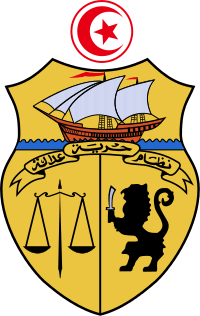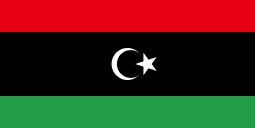Foreign relations of Tunisia
 |
| This article is part of a series on the politics and government of Tunisia |
|
Judiciary |
| Foreign relations |
Former President Zine El Abidine Ben Ali has maintained Tunisia's long-time policy of seeking good relations with the West, while playing an active role in Arab and African regional bodies. President Habib Bourguiba took a nonaligned stance but emphasized close relations with Europe and the United States.
North Africa
Regional
Wedged between Algeria and Libya, Tunisia has sought to maintain good relations with its neighbors despite occasionally strained relations. Tunisia has supported the development of the Arab Maghreb Union (UMA), which includes Algeria, Morocco, Mauritania, Libya, and Tunisia. Progress on Maghreb integration remains stymied, however, as a result of bilateral tensions between some member countries.
 Algeria
Algeria
Tunisia and Algeria resolved a longstanding border dispute in 1993 and have cooperated in the construction of the Trans-Mediterranean natural gas pipeline through Tunisia that connects Algeria to Italy. In 2003 Tunisia and Algeria formed Numhyd, a petroleum company to develop oil resources. It is jointly owned (each 50%) by government corporations, Algeria's Sonatrach and Tunisia's Entreprise Tunisienne d'Activites Petroliere (ETAP). Recently Tunisia signed an agreement with Algeria in order to demarcate more exactly the maritime frontier between the two countries.
 Libya
Libya
Tunisia's relations with Libya have been erratic since Tunisia annulled a brief agreement to form a union in 1974. Diplomatic relations were broken in 1976, restored in 1977, and deteriorated again in 1980, when Libyan-trained rebels attempted to seize the town of Gafsa. In 1982, the International Court of Justice ruled in Libya's favor in the partition of the oil-rich continental shelf it shares with Tunisia. Libya's 1985 expulsion of Tunisian workers and military threats led Tunisia to sever relations. Relations were normalized again in 1987. While supporting the United Nations sanctions imposed following airline bombings, Tunisia has been careful to maintain positive relations with its neighbor. Tunisia supported the lifting of UN sanctions against Libya in 2003, and Libya is again becoming a major trading partner. Currently, Tunisia has a maritime dispute with Libya.
 Morocco
Morocco
Trade is increasing between Tunisia and Morocco. Direct maritime shipping commenced between the two countries in 2008 to supplement rail connections that remained uncertain. Also, the stock exchanges of Tunis and Casablanca this year began to jointly list the stock of a Maghriban company, this initial case involving an IPO.[1]
Middle East
Regional
Tunisia has long been a voice for moderation and realism in the Middle East. Tunisia served as the headquarters of the Arab League from 1979 to 1990 and hosted the Palestine Liberation Organization's (PLO) headquarters from 1982 to 1993, when the PLO Executive Committee relocated to Jericho and the Palestinian Authority was established after the signing of the Oslo Accords. The PLO Political Department remains in Tunis.
Tunisia consistently has played a moderating role in the negotiations for a comprehensive Middle East peace. In 1993, Tunisia was the first Arab country to host an official Israeli delegation as part of the Middle East peace process and maintained an Interests Section until the outbreak in 2000 of the Intifada. Israeli citizens of Tunisian descent may travel to Tunisia on their Israeli passports.
 Egypt
Egypt
In the 1950s the President of Tunisia, Habib Bourguiba, criticized on pragmatic grounds the type of Arab nationalism then promoted by Gamal Abdel Nasser of Egypt, which was a widely popular ideology at the time in the Arabic-speaking countries. Their disagreement also concerned the policies of the Arab League. Bourguiba and Nassar eventually came to find some common ground.[2] Although ties were broken under Nasser, and again under Anwar Sadat, on the whole relations between Egypt and Tunisia have remained mutually beneficial.
After the Tunisian revolution in 2011, the Tunisian-Egyptian relations were very good, especially after the 2011 elections in Tunisia, where won the Ennahda Movement Islamic-oriented the elections, as well as the Muslim Brotherhood movement in Egypt won the elections, and also the convergence between the two presidents Moncef Marzouki and Mohamed Morsi. But since the 2013 Egyptian coup d'état, relations became increasingly strained, and between the two and considered Tunisia that what is happening in Egypt is a military coup d'État bloody and protested against it in the United Nations, which led to a diplomatic crisis in relations severed in an indirect way and there is a lack of official visits at all levels. After the 2014 elections in Tunisia and the win of Nidaa Tounes's secular movement, improved relations and exchanged visits between officials and ministers.
 Iran
Iran
In May, 2005, Tunisia signed with Iran an agreement for cooperation in air, sea, and road transportation. It was signed on the visit of Tunisian minister Abderrahim Zouari to Iran.[3]
 Lebanon
Lebanon
Tunisia and Lebanon share historical and civilizational ties. In June, 2010, the Tunisian Prime Minister Mohamed Ghannouchi and his Lebanese counterpart Mr. Saad Hariri chaired a Tunisian-Lebanese working session. Both countries want to energize the process for the Euro-Mediterranean Partnership. In addition, Tunisia reaffirmed its support of Lebanon.[4]
 Saudi Arabia
Saudi Arabia
In July 2010, a Tunisian-Saudi non-double taxation agreement was signed in Tunis, by Finance Minister Ridha Chalghoum and his Saudi counterpart Ibrahim Bin Abdulaziz Al-Assaf. The two ministers said this convention will certainly help boost trade exchanges between Tunisia and Saudi Arabia, stimulate investments, and favour exchange of expertise between the two countries.
In particular, it will further the Tunisian-Saudi Investment and Development Bank "STUSID Bank" in developing financial co-operation and the contribution of the Saudi Fund for Development (SFD) to boost the development process in Tunisia. The minister highlighted the importance of drawing on the two countries' expertise in the tax and customs field and set up a joint action plan to strengthen co-operation.[5]
 Syria
Syria
The 11th session of the Tunisian-Syrian High Joint Committee met in Tunis in May, 2010. The two countries share experience and information on such issues as housing, shipping, and tourism.[6]
 Turkey
Turkey
Tunisia has an embassy in Ankara and a consulate-general in Istanbul.[7] Turkey has an embassy in Tunis.[8] Both countries are full members of the Union for the Mediterranean.
 France
France
Tunisia and France retain a special relationship due to their history, geographic location, and economic relationship. In France there is a sizeable Tunisian diaspora, and the French language is widely used in Tunisia. Business and government connections are extensive and mutually maintained. Ranked by country, France receives the largest amount of Tunisian exports, and France is number-one regarding Tunisian imports also. In recent years many French companies have re-localized production to Tunisia.
Rest of Europe
| Country | Formal Relations Began | Notes |
|---|---|---|
| 1956 |
| |
| 1993-01-30 |
| |
| 1999 |
| |
| ||
| 1956-06-08 |
Greece-Tunisia relations | |
| | ||
| See Italy–Tunisia relations | ||
See Malta–Tunisia relations
| ||
| 1963 | See Romania–Tunisia relations
| |
| 1956 | See Russia–Tunisia relations
Russia has an embassy in Tunis, and Tunisia has an embassy in Moscow. | |
|
Tunisia enjoys good relations with Serbia and are important trading partners. Tunisia is a hugely popular tourist destination for Serbs. |
Rest of world
 Canada
Canada
 Japan
Japan
Tunisia and Japan have a visa agreement, Tunisian people traveling to Japan and Japanese people traveling to Tunisia do not need a visa, as long as their stay do not exceed 3 months. Japan also support Tunisia, with equipment and money donations. Both countries had friendly relations since Tunisia's independence in 1956. Since 2015, Tunisia and Japan are allies under the Major non-NATO ally agreement.
 Pakistan
Pakistan
Pakistan supported Tunisia on the issue of its complete control on Bizerte and declared it an integral part of Tunisia. People of Pakistan always supported Tunisia in their struggle of freedom. Former Tunisian president Habib Bourguiba had always supported Pakistan's point of view and both countries enjoy very good relations.
 South Korea
South Korea
Establishment of Diplomatic Relations between the Republic of Korea (South Korea) and the Republic of Tunisia is March, 1969.[16] Since 2015, Tunisia and South Korea are U.S. allies under the Major non-NATO ally agreement.
 United States
United States
The States has very good relations with Tunisia, which date back more than 200 years. The United States has maintained official representation in Tunis almost continuously since 1795, and the American Friendship Treaty with Tunisia was signed in 1799. The two governments are not linked by security treaties, but relations have been close since Tunisia's independence. In each case, however, relations warmed again quickly, reflecting strong bilateral ties. The United States and Tunisia have an active schedule of joint military exercises. U.S. security assistance historically has played an important role in cementing relations. The U.S.-Tunisian Joint Military Commission meets annually to discuss military cooperation, Tunisia's defense modernization program, and other security matters. Since 2015, Tunisia and the United States are allies under the Major non-NATO ally agreement.
Foreign Ambassadors
- Farid Abboud, Lebanese Ambassador to Tunisia (2007–present)
- Jake Walles, American Ambassador to Tunisia (2012–present)[17]
Footnotes
- ↑ "Direct maritime transport commences between Tunisia and Morocco" www.magharebia.com - April 4, 2008.
- ↑ Jacques Baulin, The Arab role in Africa (Penguin 1962) at 118-128.
- ↑ "Iran, Tunisia sign deal on transportation cooperation," People's Daily Online, May 16, 2005.
- ↑ "Tunisia, Lebanon delagations hold working sessions" www.tunisiaonlinenews.com - June 26, 2010.
- ↑ "Tunisia-Saudi Arabia: Non-double taxation agreement signed" www.zawya.com - July 8, 2010.
- ↑ "Tunisia-Syria boost bilateral co-operation" www.tunisiaonlinenews.com - May 14, 2010.
- ↑ Tunisian embassies in Turkey
- ↑ Turkish Ministry of Foreign Affairs about the relations with Tunisia
- ↑ Bulgarian embassy in Tunis
- ↑ Danish embassy in Algiers, also accredited to Tunisia (in Danish and French only)
- ↑ Embassy of Finland in Rabat (in Finnish, Swedish, French and English)
- ↑ Ministry of Foreign Affairs of Greece
- ↑ Ministry of Foreign Affairs of Greece
- ↑ "Sorry. The page you are looking for does not exist" (PDF). Retrieved 20 February 2015.
- ↑ Romanian embassy in Tunis (in French and Romanian only)
- ↑ http://www.mofa.go.kr/ENG/countries/middleeast/countries/20070824/1_24486.jsp?menu=m_30_50
- ↑ https://www.cia.gov/library/publications/the-world-factbook/fields/2007.html#ts